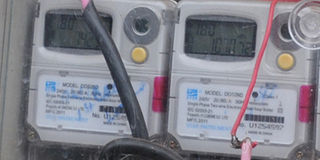Pre-paid electricity project is not mandatory by law

There is no Uganda law requiring anybody to shift to a prepaid payment plan and that, therefore, all consumers have a choice to switch to the prepaid plan or to stick with the legally mandated postpaid plain. Photo by Faiswal Kasirye.
What you need to know:
I wondered where Umeme Limited, a private company, derived the power to direct me to switch from the postpaid to the prepaid arrangement and where it got the power to direct me to stay at my home all day on a working day. I looked up the law and was not surprised to find that neither the Electricity Act 1999 nor the regulations of the Primary Grid Code give it such powers.
Tuesday this week was a long and stressful day. I got home late in the evening to find a document from the head Office of the electricity distribution concessionaire, Umeme Limited, marked “Notice to consumer” lying neatly on my dining table. The notice required me to report myself to the Kitintale District office within 48 hours to “explain my circumstances”, failing which I would be liable to “disconnection and/or prosecution under section 52 of the Electricity Act/or section 270 of the Penal Code Act.” Why? Because I had “totally refused Yaka prepaid electricity”.
The notice did not come out of the blue. In January 2012, I had received a letter directing me to spend Monday, February 27 2012 at my home waiting for Umeme’s engineers to turn up, at their convenience, to install a Yaka prepaid electricity metre. The lawyer in me picked up on the mandatory language of this letter. I wondered where Umeme, a private company, derived the power to direct me to switch from the postpaid to the prepaid arrangement and where it got the power to direct me to stay at my home all day on a working day. I looked up the law and was not surprised to find that neither the Electricity Act 1999 nor the regulations of the Primary Grid Code give it such powers.
I engaged the Head Office and was pleased to meet with their in-house counsel, the head of marketing and the head of the Yaka pilot project. We had a polite and good humoured exchange in which we agreed that there is no law requiring anybody to shift to a prepaid payment plan and that, therefore, all consumers have a choice to switch to the prepaid plan or to stick with the legally mandated postpaid plain. I told them that as an informed consumer I chose to remain on the postpaid plan because I did not want to lend a large corporation money and would not do so unless the law expressly states that I have to. In that meeting it was conceded that the mandatory language in the letter was misplaced and most of the time was dedicated to discussing how the Yaka prepaid project could be legally marketed – with the consumer being informed that they have a choice.
On Tuesday I found out that, contrary to what I was told by senior managers in January 2012, Umeme did not go away to change the language of its marketing for the Yaka programme. It had retreated to hatch a plan to threaten me with disconnection and prosecution!
Now, if you are going to threaten anybody, leave alone a lawyer, with prosecution then you had better cite a law which criminalises the conduct complained of. The laws cited in the notice left at my home were completely irrelevant to the alleged offence of “totally refusing Yaka prepaid electricity.” Section 52 of the Electricity Act provides for reversion of a hydropower plant with a generation capacity exceeding 10MW to the government after the expiry of a generation licence. Section 270 of the Penal Code Act provides courts with powers to make compensation orders against people who have been convicted of causing financial loss, embezzlement or theft by agent. In colloquial Luganda “baali banyungako section”!
Using social media, I reached out to Umeme and many fellow consumers on this issue. The response was overwhelming. Nobody has been told of the basic fact that Umeme does not have the power to compel anybody to switch to the prepaid plan. Many consumers have been compelled to switch under threats of disconnection and prosecution and have complied out of ignorance. This despite the fact that Umeme knows that it has no legal powers to compel consumers.
You can’t help but wonder why a listed company that is majority owned by Actis Capital (a subsidiary of the UK’s Commonwealth Development Corporation), with top notch institutional investors like the International Finance Corporation (a division of the World Bank) and managed by some of the best qualified individuals (judging from the size of their pay cheques) would engage in such unethical and, frankly, illegal behaviour. The answer is simple; it’s because there is a lot of money to be made and Umeme can, and most likely will, get away with the shabby treatment of its ignorant, pliable and captive consumers.
Umeme expects that a quiet apology made to me will make the whole thing will go away. Being Uganda, I am sure that Umeme, its investors, board and senior management will carry on with business as usual. Blame will be apportioned to the lowest possible level, perhaps even outsourced to a contractor. There will be no widely publicised apology, leave alone compensation, for all of the consumers who were illegally and unethically intimidated into giving up their legal rights under the existing law so that Umeme may make more profits.
But at least now you know your rights and you know what kind of corporation Umeme really is. If you are not holding onto a hydropower plant with a generation capacity of 10 MW after the expiry of your generation licence, you are perfectly entitled to say “No, thank you!” to Yaka prepaid metres.
[email protected]
Twitter: @dfkm1970




